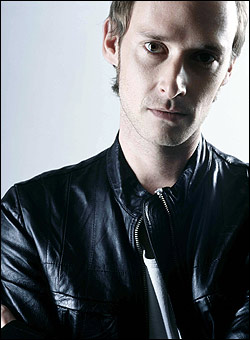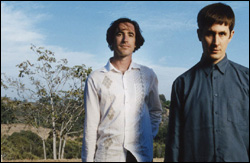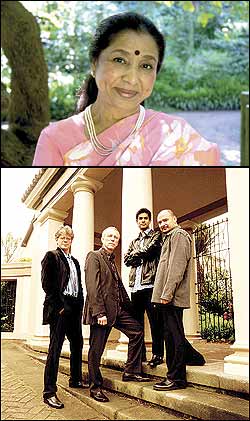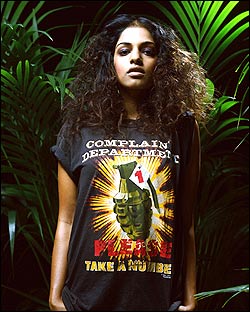Michael Mayer is the co-owner (with Wolfgang Voigt and Jürgen Paape) of Cologne label, store, and distributor Kompakt, one of the strongest and most consistent dance-music imprints in the world. Mayer, 34, also maintains an aggressive global touring schedule as a DJ; produces superlative tracks and remixes that draw on ’80s pop, house, and minimal techno; and is an avid cook, mixing ingredients (think “minimal pasta,” among other things) as effortlessly as he mixes records. Mayer’s DJ sets sweep from teasingly sexy and luscious to menacingly hard and banging. He has an uncanny ear for pacing and timing and layers tracks to reach massive, nearly unbearable buildups and euphoric peaks, as demonstrated on the stellar Immer and Fabric 13 mix CDs.
In December, Mayer issued his debut album as an artist, Touch, an uneven but inviting stroll through his swirl of influences. Tracks like “Neue Luthersche Fraktur” have instant appeal as sweaty, hands-in-the-air club anthems, while others, like the steamy slow burner “Lovefood,” showcase Mayer’s brooding, darker side. The Jukebox was conducted in Cologne’s Kompakt offices in August, two days after the marathon Kompakt 100 Festival.
The Age of Love: “The Age of Love (Watch Out for Stella Club Mix)” (1990) from Classic Acid (Moonshine)
Michael Mayer: [Hi-hat kicks in.] Ah, I know it. It’s old. Yeah, that’s a fucking classic; it used to be so big here in Cologne. You’d drop it at a party, and people would freak out. It was one of the biggest anthems for the Cologne gay scene. The first years of techno here—’91, ’92, ’93—the gay community was much heavier involved into the club and techno here in Cologne. When I hear this, I always remember the times when clubs like Space Club were on and all the cute gay guys with their slim dresses [laughs].
Seattle Weekly: What was Cologne like in the early ’90s?
Mayer: It was one of the techno capitals in Germany. Berlin, Frankfurt, and Cologne had the most solid scenes, the best clubs and stuff. I moved here in ’92, and yeah, Cologne was totally on E [laughs], but in a very good way.
I always thought that the Cologne party scene was very particular, much different from other cities in Germany. There’s a special vibe. I dunno, it’s difficult to explain, but I’m always happy to be back in Cologne and play here. Then I always remember why I’m here in the city. It’s always a bit more relaxed, not too hysterical in a way. People are cool, friendly, and they know how to party.
Telex: “Moskow Diskow” (1979) from The History of the House Sound of Chicago (BCM)
Mayer: [immediately] Telex, “Moskow Diskow.”
SW: Did you listen to much of this old stuff?
Mayer: Yeah, sure! I mean, I’m a disco kid. I grew up with disco music, especially late-’70s, early-’80s stuff. My first favorite discotheque where I went every weekend, they played all this stuff all night long. All this disco stuff, the Italian stuff—which came years later—but this was the main attraction at the club. They had this four-color laser show and this music. For me, it was paradise. This is where I come from.
SW: What kind of music did you listen to when you were small?
Mayer: I grew up more or less in the countryside, in the Black Forest area of Germany. I was very lucky to have this club in my neighborhood. It used to be Europe’s best discotheque, voted by some disco magazine. It was called Drops, a big discotheque for 3,000 people, with a swimming pool and a lion cage and whatever [laughs]. Typical ’80s disco—OK, there’s a pizzeria, and there’s a second floor, you know, those kind of places. They were always totally up to date musically. They played imports; they had a radio station, a pirate radio station, where they played 12-inches all day long, [with] specialized shows for funk, for acid house, for [’80s Europop producers] Stock-Aitken-Waterman’s kind of sound, which I really liked as well. For me that was such a big help, because they played all this music to me that I could listen to at this radio station. They played disco history from the last 10 years and the latest stuff and everything.
From a very early age, I was totally obsessed with all facets of nightlife, of discotheques. The technical side, the lights and sound system and everything, totally. I love old discotheques, original old discotheques. There are a few very nice ones. [There’s] one in Portugal—it has this perfect Saturday Night Fever floor, with the lights inside it [laughs].
Basic Channel: “Octagon” (1994) from 12-inch (Basic Channel)
SW: For some people, Kompakt is the new Basic Channel, the influential mid-’90s label that helped define the German techno sound.
Mayer: Kompakt isn’t one sound; it’s an ocean of sounds, everything from ambient to hard techno. Basic Channel was a very strict concept; Kompakt is not. Kompakt is the most open system you can imagine—if it’s not drum and bass [laughs]. We love to embrace all kinds of musical genres and styles, and just colors. Basic Channel was very rigid in their concept. I think there’s a big, big difference. You can say what Wolfgang [Voigt] used to do [under the pseudonym] Studio 1 during this period [had] big similarities to our work, but now I think, no.
SW: Did you still listen to Basic Channel much?
Mayer: Yes, of course! I have them all. It was very important. When I heard the first Basic Channel release, my ears were bleeding. It totally sounded like DJ Pierre, but from another dimension. At the point where DJ Pierre would have used vocal snippets and vocal loops, they were much more radical. I thought, “Wow, finally somebody did it,” and it was such a relief for me. Because I was playing a lot of house music, and at a certain point . . . I was always into the B-side tracks, the dub versions. I was never into vocal house really. I was happy that suddenly there was this new gate that wasn’t techno and not house but somewhere in between that was totally my street. When you heard [Basic Channel artist] Maurizio for the first time in a club on a big sound system, it was like a religious experience. Nobody masters records like this. They’re just the best-sounding records on earth.
T. Rex: “Hot Love” (1971) from Electric Warrior (Expanded & Remastered) (Rhino)
Mayer: Ah, this is the original [laughs].
SW: Yes. On last year’s Kompakt 100 compilation, Freiland’s “Frei” was remixed by Justus Köhncke, with Meloboy singing this song on top of it. How did that glam sound of Kompakt, the schaffel sound, come about?
Mayer: That was mainly Wolfgang’s influence. Wolfgang is older than I am, and this was totally his teenage-years soundtrack. He was totally into T. Rex and Gary Glitter and all those guys. Since I can remember, he always did schaffeltechno tracks, trying to combine this T. Rex mania with the stripped-down acid stuff. He was making schaffel tracks in ’91. I was always like, “Whoa, that’s bizarre—people won’t be able to dance to this. It’s impossible to mix this and a straight techno record.” For the first few years, it was just an amusing side effect of Wolfgang’s creative work. And somehow it got stronger and stronger. It seemed like a very nice alternative, like when you play for eight hours, after six hours you play three, five, six schaffel tracks, and there will be so much fresh air in the club suddenly. You can literally see how people release their muscles and move in a different way. So it was meant to be just an alternative, a supplement to the usual techno formula. It was never meant to be the next hype, the next big thing. To play schaffel tracks all night long is the most stupid thing you can do; it’s boring. Some people, unfortunately, do it, and at this point, we don’t release schaffel tracks anymore. We need to give it a break.
SW: So there won’t be a third volume of the Schaffelfieber [Shuffle Fever] anthologies Kompakt has put out?
Mayer: Maybe one day, but now it’s just getting to be too much. The demos we receive, on every fucking CD there’s a schaffel track. We always try to protect schaffel from getting over the top, but now it’s unstoppable. On every label you find schaffel tracks. It’s boring. It’s interesting as long as it is still provoking in a way, but now it’s just state of the art. It’s not risky anymore. We always prefer to do something as long as it’s risky and not when it’s already established. Schaffel will come back for us, I’m sure, but it [has become] a pain in the ass.
Prefab Sprout: “Cars and Girls” (1992) from The Best of Prefab Sprout: A Life of Surprises (Sony)
Mayer: That’s Prefab Sprout. Paddy McAloon is such a genius—his voice [along with] the most incredible pop arrangements ever done. Even his latest album, Andromeda Heights, [is] even better than everything before it, I think. He’s in such a bad state—I think he’s blind now? But he’s still creating this wonderful music.
I discovered them quite late; I didn’t listen to them in real time in the ’80s. That was something Wolfgang and Reinhard [Voight; Kompakt producer and Wolfgang’s brother] showed me when we met in ’92, comparing our musical pasts, and exchanging things. I’m super thankful that they gave me Prefab Sprout.
SW: As a DJ, you have a lot of pop influence. Not that you play pop, but you think pop, even when you’re making a track, in a very different way than most techno DJs. Does that come from a lifetime of listening to music like this?
Mayer: Yeah. I have a strange relationship to pop music, or had as a teenager, like ABC and Pet Shop Boys. It was dance music, not pop music, but I didn’t [notice the] difference. It was just something I could play at my parties, and I could buy the 12-inch and do these nice remixes and stuff. So for me, in pop music, the groove and the danceability were more important than the lyrics. All the lyrics are in English, and it took me a while to understand the lyrics in the first years of my youth. When I first started to buy records and to get into it, I didn’t listen to the lyrics. It was just another instrument to me. There was no content. It might be difficult to understand for native English-speaking people, but if you don’t speak the language, the lyrics are meaningless. It just sounds nice if you imagine something of what it could mean. Maybe you feel like it is about love or about riots.
And still, when I DJ, I still treat tracks like songs. I still play tracks that have an arrangement and a beginning and an end and something to tell. I still have this big respect for structures. I’m not the type of DJ that keeps the cross-fader in the middle all night. I give the record the respect it deserves. I will mix when there’s the part where you’re allowed to mix. Every [dance] producer [includes] this part where OK, you’re a DJ, now you can mix. It’s just my school of DJing. When I’m producing tracks, I also keep this in mind. It’s like something happens automatically; I could never do a record without an arrangement. I could not just let it go for five-and-a-half minutes and then press stop.
Pet Shop Boys: “I Wouldn’t Normally Do This Kind of Thing (DJ Pierre Wild Pitch Remix)” (1994) from Disco 2 (EMI)
Mayer: Aha! DJ Pierre! I wouldn’t be here if DJ Pierre didn’t exist. DJ Pierre is just a supergod. Ah, the Pet Shop Boys! Yeah, of course [laughs].
SW: When did you start listening to the Pet Shop Boys?
Mayer: It was the first CD I bought, when the first single [“West End Girls”] came out, ’85, around that time. The Pet Shop Boys for me [were] the most amazing dance music at that point—[they had] this energy from old disco tracks, but they sounded more artificial and high-tech in a way, and I always loved the artwork. I was able to understand their lyrics [laughs] because they were in very clear English. They were just my favorite band for years. I still buy every record they release, even if I think they’ve lost it a bit. They’re very influential. They were the soundtrack for my first love and things like this.
SW: And DJ Pierre?
Mayer: DJ Pierre saved my life two times, with acid and later on with wild pitch [Pierre’s signature production technique]. When I heard “Generate Power” [produced by Pierre under the name Photon Inc.] and “Rise From Your Grave” [as Phuture] for the first time, I was just crying. It was the most intense dance music, the most hypnotic dance music on earth. For years and years, I played nothing but wild pitch all night.
DJ Pierre played Cologne in ’93, at this party in an empty factory—a wild illegal party. He started to play quite early. I remember I arrived at the party totally excited. I didn’t even manage to get myself a drink or roll a joint or anything, because he’d already started playing. I went to the dance floor and I didn’t leave for six hours. It was the first time somebody made me cry on the dance floor. I was just so amazed by this man, the way he combined hard acid and vocal house, and this wild-pitch technique. It was the first time I saw somebody working the equalizer like [him]. It was one of the most magic nights that I will remember until the end of my life.
The day after, I did an interview with him for Frontpage, the techno magazine. He’s such a nice person, very kind and very shy: [puts on a very soft voice] “Oh, I didn’t really know that acid was that important here . . . really? You like these records, you know these records?” And I was like, “Do I know these records?!” All of Europe was talking about these records. This was the reason I started producing and DJing. I was shocked that it seemed he totally missed that he was a superstar here [laughs]. I would love to be more in touch with him, to give something back. I can’t stand to see him playing at shitty huge house clubs for the Marlboro tour in Germany.
SW: Are you friends?
Mayer: No, not at all. I don’t know him; I just met him once in ’93. But sometimes I have this feeling that somebody should rescue him. Somebody should show him all this beautiful music.
LCD Soundsystem: “Yeah (Crass Version)” (2004) from DFA Compilation #2 (DFA)
Mayer: [sings along] It’s cool. I never played the original version; I always played the a cappella. I’m so happy to have the a cappella version on the record. I imagine that they had so much fun when they recorded it. It must’ve taken a hundred times to record it without laughing their asses off.
That first LCD Soundsystem [12-inch], “Losing My Edge,” when I found it at the shop, we just ordered one or two copies because nobody knew what it is, and I was like, “Fucking hell, what is this? It must be old.” I played it at the club, and people freaked out totally; it’s such an energetic record. And he mentions Cologne [laughs]. I’m happy that they’re there. I don’t like everything they do, but they’re very important, to save this disco-not-disco movement from being totally electroclash.
The good thing about electroclash is that it brought songs back into techno; the younger people learned a lot, that it’s possible to play a song within a techno set, which was not possible before. [The crowds] would’ve looked at you like you were an alien. That’s the good thing about it. But for me personally, it also destroyed a lot of the things I adored in the ’80s. I loved it, it’s a part of me, and they used it in an ironic way. That’s what I hated about electroclash, like, “I disguise myself, ha, ha, ha, I’m so funny, I’m so shocking, I’m so cool.” I hated this ironic approach to something that meant a lot to me.
Mouse on Mars: “Frosch” (1994) from Vulvaland (Too Pure)
Mayer: Hmm.
SW: It’s German.
Mayer: Is that from Cologne? No one would play a bass drum like that in Cologne. The rhythmic boop-boop-boop—in Cologne it’s always [makes steady 4/4 sound], it’s not like this. It’s a nice track.
SW: It’s Mouse on Mars.
Mayer: This is Mouse on Mars?! From the new album?
SW: No, this is old.
Mayer: Seriously?!
SW: Yeah.
Mayer: [laughs] This might be the only techno track they did. No, that’s not true, but . . . I’m looking forward to hearing the new album. I haven’t had the time to listen to it yet. Mouse on Mars, they’re such a unique, stand-alone system. You can’t connect them to anything else. Every record is such a treasure of ideas, half Dusseldorf, half Cologne. Jan [St. Werner] is a very nice guy. It’s a pity—in the mid-’90s we used to hang out so much more, in the Liquid Sky club. Now it’s the A Musik [store/label] universe and the Kompakt universe. We drifted apart a little bit—always a pity. A Musik used to be around the corner from our shop, so it was always great to go there and check this obscure stuff. I haven’t been to A Musik in about two years, I think. It’s a shame. It’s kind of near here, but a different part of the city. But that explains the bass drum [laughs].
SW: You said they wouldn’t do it in Cologne?
Mayer: Yeah, it’s Dusseldorf. It’s a Dusseldorf bass drum [laughs].
Michael Mayer plays Chop Suey at 8 p.m. Mon., March 7. $10 adv.







